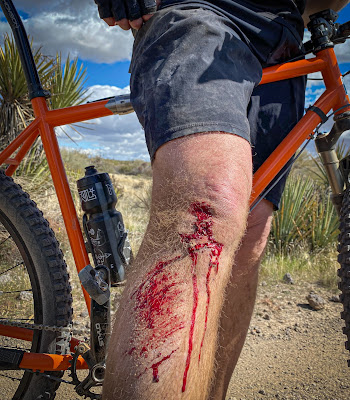Clostridium tetani is the bacteria that can cause "lockjaw" and it's found in soil worldwide, including your local trails. Let's discuss the bacteria, the disease, and how you can keep yourself from getting it.
First, like I said, the bacteria is found everywhere, but there are key important features of the bacteria--its ability to form spores and to produce toxins that make it dangerous.
Like all living things, bacteria need certain conditions to survive, but the ability to form spores allows these single-celled organisms to resist extreme heat and many antiseptics, and they can lie in wait for years. They are essentially metabolically dormant, but can convert to an active form under the right conditions, such is in your tissues.
The spores--again found in soil worldwide--enters the skin whenever there's a break in it. Puncture wounds have a higher risk, such as getting stabbed with a rusty nail, but even minor abrasions, such as little trail road-rash, can result in exposure.Other types of wounds that have a high risk of exposure include obviously contaminated wounds (with soil or feces), burns, crush injuries, and injuries with necrotic (dead) tissue.
If the bacteria enter the body and find their way into a low-oxygen environment, they convert from spores to active bacteria and start producing a neurotoxin called tetanospasmin.
Neurotoxins target the cells--neurons--in our nervous system, and the neurotoxins made by Clostridium tetani, and the closely related Clostridium botulinum, are some of the most powerful toxins known.
C. tetani toxins produce a spastic paralysis and C. botulinum's toxins can lead to flaccid paralysis, but either can progress to respiratory failure and death. In the case of tetanus, the toxin blocks the muscles' abilities to relax, and the spasm can be so severe that it leads to torn muscles and broken bones.
Muscles in the jaw are some of the commonly associated targets in a tetanus infection, which is why the diseases is often called "lockjaw." In reality, there are four clinical patterns of the disease; generalized, local, cephalic (head and neck), and neonatal.
Neonatal tetanus would be beyond the scope of this article (unless you're giving birth on the trail while out on a hike).
The disease can manifest a few days to weeks after exposure to the bacteria, and can be mild or severe, up to fatal if the respiratory muscles are affected.There is no test to confirm the diagnosis, which can lead to a delay in treatment, but there is also no real cure.
Killing the bacteria (with antibiotics), doesn't affect the toxin that's already attacked the neurons, but antibiotics along with surgical wound debridement will halt new toxin production. Immunoglobulins (proteins from the immune system), can help neutralize circulating toxins, but toxins that are already bound to neurons are already doing their damage. With that in mind, the only other options are to treat the symptoms (drugs to reduce the spasm), prevent complications, and to hopefully wait it out. The infection can last about 6 weeks, while neurons regenerate. That's 6 weeks of hopefully not getting some other hospital acquired infection, or needing to be on a respiratory, or getting a blood clot or any other problem, and then long term therapy after to hopefully regain full functioning.
Sounds like a HUGE pain in the ass that can be avoided by keeping up with your tetanus vaccines.
So how often do you need a tetanus vaccine?Assuming that, as a child you had all of your regular vaccinations, you can keep up with an every 10 year cycle of maintaining an up-to-date vaccine. That will keep you safe with any "clean and minor wounds." All other wounds--that are not "clean and minor," should be have a tetanus vaccine that's within 5 years. The "other" wounds are described as "Such as, but not limited to, wounds contaminated with dirt, feces, soil, or saliva; puncture wounds; avulsions; or wounds resulting from missiles, crushing, burns, or frostbite."
For my purposes as an emergency medicine provider, I always err on the side of making sure the vaccine is within 5yrs, unless it's a very "clean and minor" wound.
So, check your vaccination records!
While preparing for this article I started thinking that I had no idea when my last tetanus shot was, but now I do. It was this morning. We'll see when my arm starts to feel sore...
Please remember, the information presented here, including but not limited to, text, graphics, images and other material contained on this website are for informational purposes only. No material on this site is intended to be a substitute for professional medical advice, diagnosis or treatment.






Comments
Post a Comment